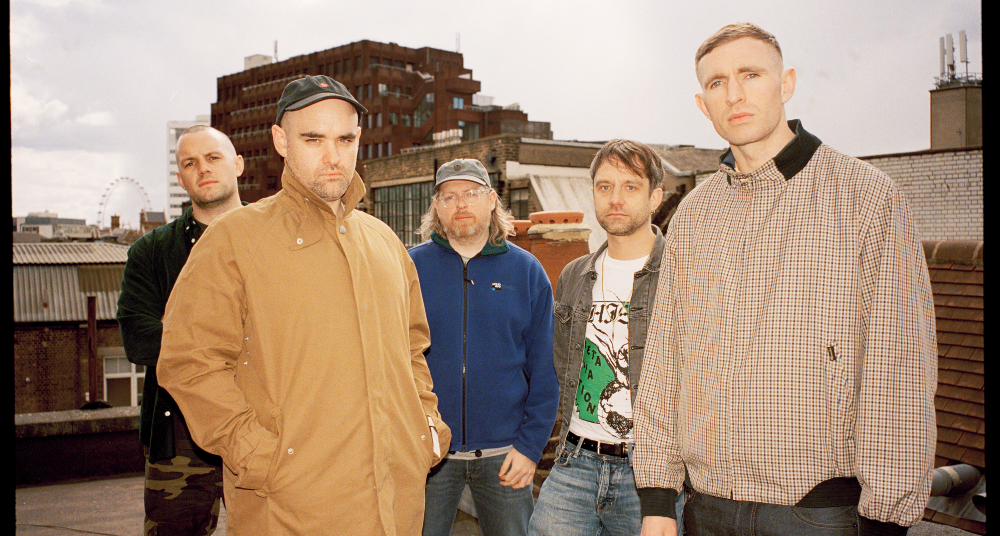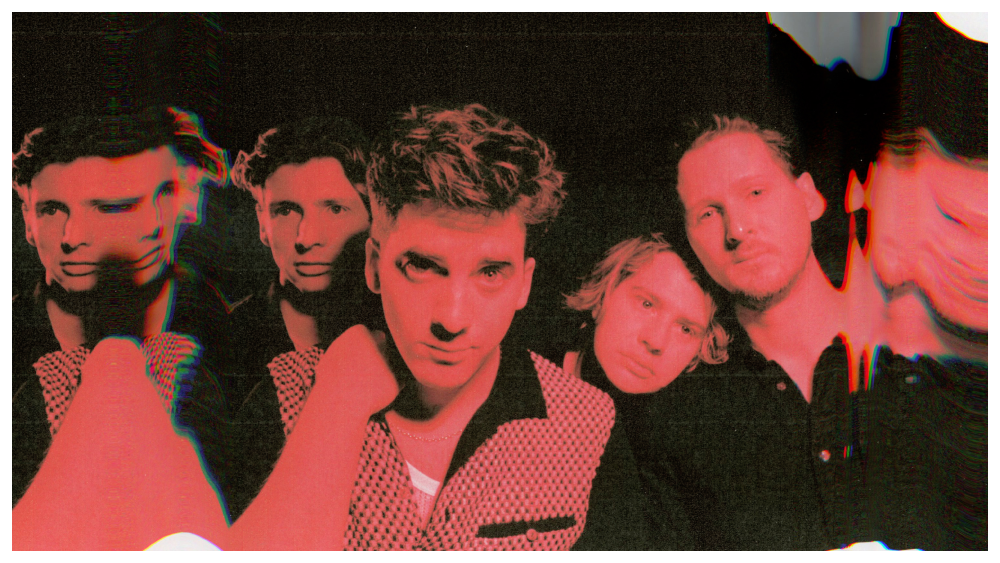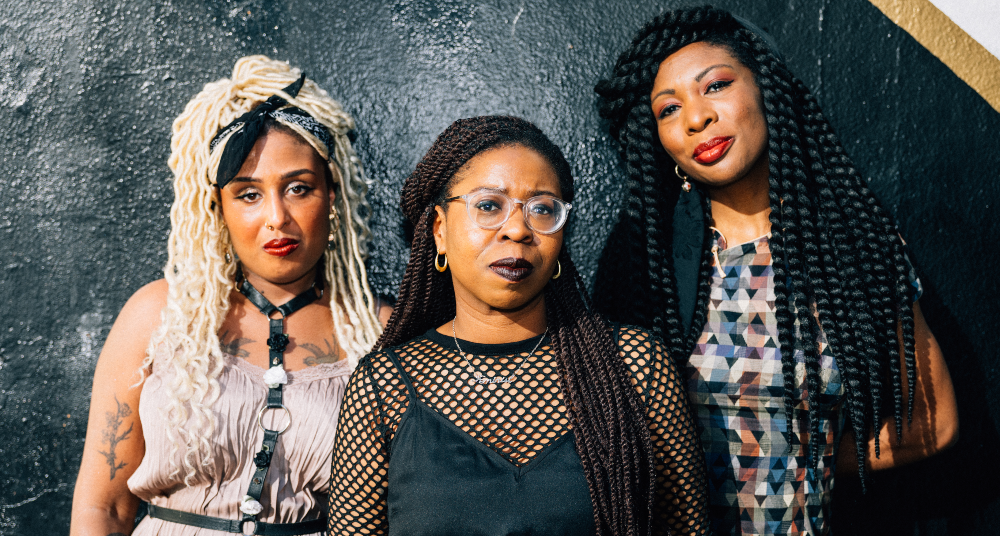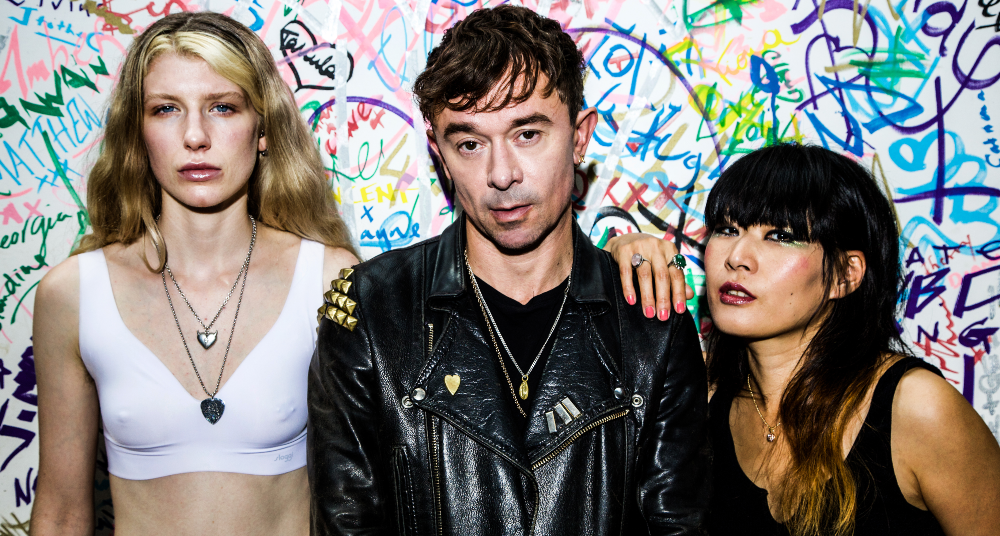There are plenty of acts that neatly fit the stereotype of the brooding, forever angry at the world hardcore band. Rising stars of the London DIY hardcore scene, High Vis, want nothing more than to move away from that image. The band are veterans of a scene where the outpouring of emotion that hits you in the belly of the pit can quickly turn negative, as they all experienced over the years. 'We've always been quite volatile people,' frontman Graham Sayle reflects in his melodic Merseyside drawl, which 15 years spent living in London have had no effect on. 'That kind of that volatility is translated into an energetic performance. It's served us in that respect, until it doesn't, until it implodes, and then you just self-destruct.'
In an effort not to self-destruct the group looked inward. During the pandemic, drummer Edward ‘Ski’ Harper retrained as a counsellor and Sayle started going into therapy. 'It's definitely helped so much with communication,' Sayle explains. 'It’s made us able to have difficult conversations, which in the past would have split up our band. It's about understanding that most things come from fear and if you're not happy about something there's probably a deeper reason why.'
Ski, a born and bred Londoner who also works part time as a black cabbie, sees the change as a positive indicator for the band’s future. 'It'd be nice if we had the opposite trajectory to most bands. Most bands start off all right, and then they just get fucked up as they go through it. It seems like we started fucked up and maybe we're getting better.'
A hardcore super group of sorts, High Vis as a band formed in 2016 from the same scene as buzz bands like Chubby and the Gang and The Chisel, and have toured with acts like Baltimore hardcore punk Turnstile and US shoegaze act Nothing. The band name is a reference to a kind of working-class uniform worn by brickies and truckers alike and showcases the band’s pride in their class heritages. Though the band formed only a few years ago, members of High Vis (which also include Rob Moss on bass, and Martin MacNamara and Rob Hammeren on guitar) have been playing in influential hardcore bands for years, including Tremors, Dirty Money, DiE and The Smear.
In the beginning, the band worked from demos Ski had been making in his east London flat that were closer in shape to the brooding, menacing call of Siouxsie and the Banshees and featured Sayle adopting a more speak-sing style of vocal compared to shouting as he was used to in previous bands. It was a challenge that at first made Sayle self-conscious, but he grew to see the beauty in overcoming that hurdle. 'Once I started getting over it and recognising these parameters that you've put on yourself are just ones that you've inherited, you can either carry on with that trajectory or you can inject your own personality into something, and that's when interesting things happen.'
The group steadily built up a cult following through the release of the debut album No Sense No Feeling in 2019 on Venn Records, a driving post-punk record that contained all of the gusto of a hardcore punk show with a woozy, basement show haze that evoked Wire and early Fugazi. It is a record that leaves the listener with an uneasy sensation that all is not well and reflects the head space the band were in at the time. 'It's quite an anxiety provoking album musically for me,' Ski says. 'It was the relationship I had with the world. I was angry. Why was I angry?' Sayle jumps in, quipping, 'How long you got?'
After signing to Dais Records this year the band have announced the release of their sophomore album Blending, out in September. Produced by Jonah Falco of Canadian hardcore band Fucked Up, Blending is a dramatic shift in the band’s sound that had seen them move even further away from traditional hardcore to incorporate the jangly indie guitars of the early '90s Madchester scene and furious power pop riffs that late '80s Minneapolis punks Hüsker Dü would be proud of.
This shift is heard best in earworm single Talk for Hours, a song about recognising the need to listen and speak honestly about our feelings, set to a swaggering, Gallagher-esque soundtrack. For Sayle, rather than being driven by any one particular influence this change in sound could have only happened with the band 'opening up his people', adding, 'with the sweetness and melody and those things, we felt more inclined and able to explore that because as people we were less angry.' Previous fans of High Vis may at first find the amount of chorus pedals on Blending to be striking, but the band’s singular approach to stretching hardcore as a genre as far as it can go is impossible to resist.
Lyrically the album touches on a plethora of sobering topics, such as the managed decline of the working class on 0151, the premature death of loved ones on Talk For Hours, and drug induced states of being on Fever Dream. Despite this, the overall feeling you’re left with as a listener taking in the anthemic guitars and colossal choruses made for deafeningly loud singalongs at a festival, is triumph. It is a result Sayle pins on the band’s calmer outlook. 'It's reflective and hopeful in a sense of that I can see a different way of being,' says Sayle.
The band’s penchant for looking inward is carried over on title track Blending, a shimmering tune made for summer. Blending is a Liverpudlian term for looking good. For Sayle, it brought up questions of the figurative ‘mask’ we wear out in the world that allows us to blend into the rest of wider society. In Blending, High Vis seek to tear off said mask. 'It's about creating your own world and knowing who you are in yourself, but that might be at odds with how you're presenting to the world,' says Sayle.
The world High Vis are creating for themselves is one legions of other people want to get in on if their live shows are anything to go by. When they perform crowds rush towards the stage to raise their fists in the air and sing along to Sayle’s every word. In between songs Sayle often gives emotional speeches resulting in tears in the crowd and on stage. 'It's emotional,' Ski says, 'I’ve played in bands before and it hasn't been like that. There's some sort of energy going on when we play that's just palpable.'
In preparation for the next record, the band are already working on new demos ('Me and Graham just need to do shit all the time,' Ski admits, justifying the band’s intense work pace) that according to Sayle are influenced by '90s house and chopped up vocal lines. 'I find it dead exciting to listen to the new stuff we’ve been demoing because it feels like a natural progression,' Sayle explains.
As High Vis continue to expand and experiment with each new release, they bring with them an ever-growing new audience, one that the band see as an indicator of how far they have come. 'I've been into hardcore for over 20 years,' Sayle explains, 'and a lot of [people from the hardcore scene] I feel that they might just feel obliged to be like, ‘oh cool you're doing something I like that’. When it's that people I’ve never met in me life, and they're like, ‘I really liked that song,’ I'm just like, wow. It’s mad to think that outside of our nice safe space that is punk, people like it musically.'





